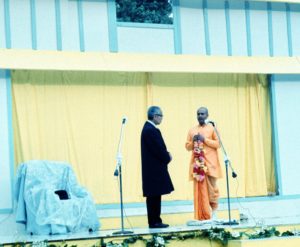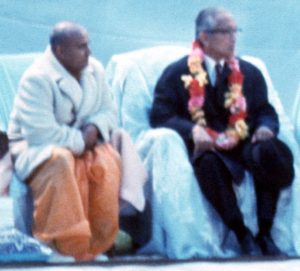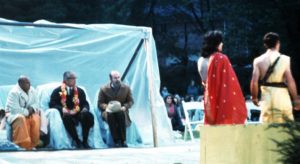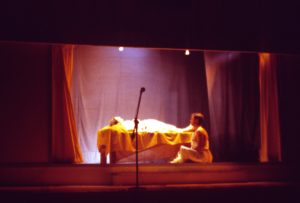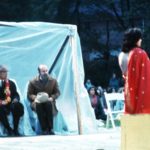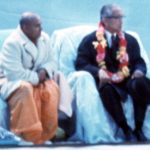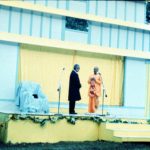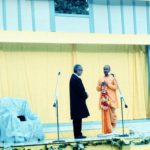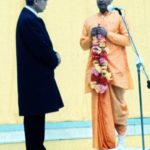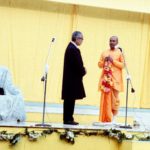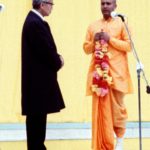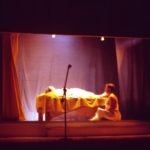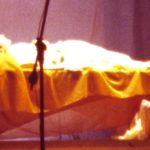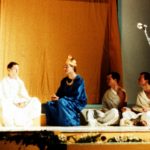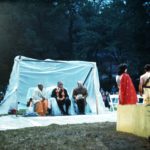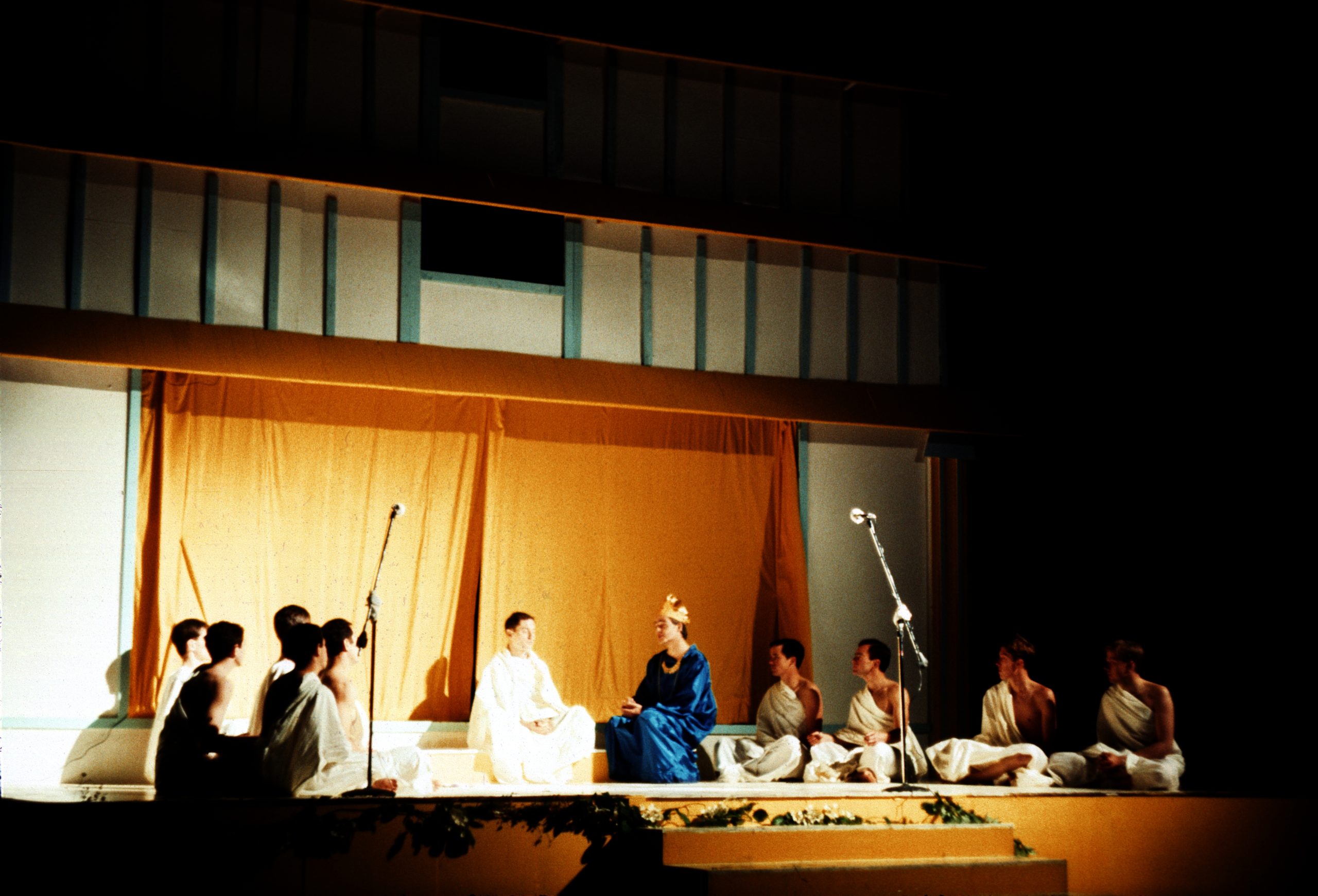Perform “Siddhartha Becomes the Buddha” for U Thant 25 May 1973
Filed under MG Members in other events | Spiritual figure and plays | Tributes and Expressions of appreciationOld Mill Farm, Harrison, N. Y.; May 25.1973
On the evening of May 25, 1973, former Secretary-General U Thant attended the first performance of Siddhartha Becomes the Buddha, a seies of one-act plays based on incidents in the life of the Lord Buddha,. It was written by Sri Chinmoy and performed by his disciples on an outdoor stage built for the occasion at Old Mill Farm in Harrison, New York. U Thant was accompanied by his daughter, son-in-law and young grandson.
* * * * * * * * * * * * * * * * * * *
Sri Chinmoy opened the programme by singing,‘
Buddham sharanam gacchami
Dhammam sharanam gacchami
Sangham sharanam gacchami
* * *
Sri Chinmoy then gave a speech of welcome and garlanded U Thant,’
“When I go to the Buddha for refuge, He blesses me.
“When I go to the Inner Law for refuge, He illumines me.
“When I go to the Order for refuge, He utilises me.”
“A child of Bihar, a son of India, a citizen of the world, a denizen of the higher spheres: Siddhartha, the Buddha.
“In the outer world He is known as the Light of Asia. In the inner world He is, indeed, an ever-illumining Light of the universe.
“To the world-sorrows He offered His heart of infinite Compassion. To the world-aspiration He offered His soul of transcendental Illumination.
“The Omnipotent did two things. Through Siddhartha Gautama, He revealed the ideal of Perfection in a human being. Through the Buddha, He revealed His Enlightenment and Compassion in a Divine Being.
“With His Heart, the Unfathomable came to the Buddha.
“With His Mind, the Unknowable came to the Buddha.
“With His Bliss, the Transcendental came to the Buddha.
“This evening we are deeply honoured and blessed by the gracious presence of our most esteemed Brother, U Thant. Two thousand five hundred years ago the World-Father, the Buddha, came with the Message of universal Peace. Now, two thousand five hundred years later, He has sent His chosen son, U Thant, to offer the same Message of Peace.
“Dear Brother, for ten long years you have served the world-consciousness most devotedly and most significantly through the world body of the United Nations. Mother Earth and Father Heaven have bestowed their choicest blessings on your devoted head, aspiring heart and illumining soul. The outer political world has lost you, but the inner spiritual world has gained you and claims you as its very own. Your silent life of aspiration, dedication and illumination is guiding the outer world and leading it to its destined Goal.
“With deepest joy and gratitude I am dedicating this play, Siddhartha Becomes the Buddha, as a humble token of my treasured feeling towards you. In you I feel the pioneer-pilot of world-peace. In you I see a beacon-light of world-redemption. And in you I discover true love of human life and an utmost reverence for Truth, both in the inner world and in the outer world.
“The Absolute Supreme claims you as His very own. The Lord Buddha claims you as His very own. We, your brothers and sisters of this world, claim you as our very own.”
* * * * * * * * * * * * * * * * * * *
U Thant replied:
“Revered and highly esteemed Sri Chinmoy and brothers and sisters, it is a great privilege to be able to participate in this spiritually rewarding experience. And for this I am most grateful to our esteemed teacher, Sri Chinmoy, for this innovative undertaking. I also feel particularly moved and touched by his very gracious blessing bestowed on me.
“Sri Chinmoy very kindly sent me a copy of the play, Siddhartha Becomes the Buddha. I have read it with great interest and with great admiration and profit. Of course, it is extremely difficult to depict the important episodes of the life of the Buddha in the course of a few minutes or an hour or so.
But I found that Sri Chinmoy has done a most remarkable job in presenting the play in simple language understandable even to the uninitiated. His stress on the basic characteristics of Buddhism – on compassion, love, renunciation, peace-should stimulate the thoughts of leaders of men and leaders of thought everywhere. As you all aree aware, I was brought up as a Buddhist by tradition, by faith and by practice. And I find myself in complete agreement with Sri Chinmoy in his enunciation of the ethical and moral aspects of Buddhism, which in my view should be the basis for each of us in our search for inner light, in our search for truth.
“Sri Chinmoy in his play also has drawn a very vivid picture of the identity between God and Truth, soul and inner Light, which I very much hope will create an abiding interest in these two great religions-Hinduism and Buddhism-which in many ways constitute the key to all great religions.
I feel very strongly, as some of my friends know, that only by the practical application of the teachings of great religious leaders, particularly the development of the moral and spiritual aspects of life as Sri Chinmoy has stressed in the play-love, compassion, tolerance, the philosophy of live-and let- live, modesty and even humility-that only with this approach, only with this method, will we all be able to fashion the kind of society we want, a truly moral society, a decent society, a livable society, which is the goal of all great religions. “I want to thank particularly those friends who are participating in this play. I wish all of you peace of mind and eternal joy, and particularly the inner joy. Thank you very much, Sri Chinmoy, thank you. Thank you. Thank you. Thank you.”
* * * * * * * * * * * * * * * * * * *
PHOTOGRAPHS TAKEN AT THE PERFORMANCE OF “SIDDHARTHA BECOMES THE BUDDHA” May 25, 1973
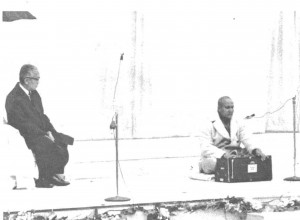 Sri Chinmoy accompanies himself on the harmonium as he sings Buddham sharanam gacchami. Dhammam sharanam gacchami. Sangham sharanam gacchami. which he set to music for the occasion.
Sri Chinmoy accompanies himself on the harmonium as he sings Buddham sharanam gacchami. Dhammam sharanam gacchami. Sangham sharanam gacchami. which he set to music for the occasion.
* * * * * * * * * * * * * * * * * * *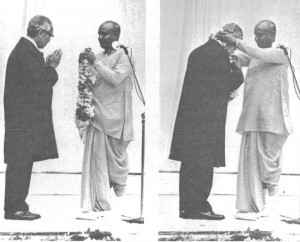
Sri Chinmoy garlands U Thant
* * * * * * * * * * * * * * * * * * *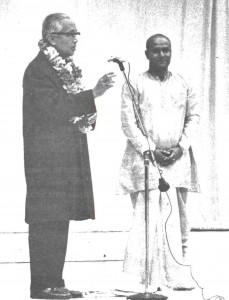 U Thant replies to Sri Chinmoy’s speech of welcome
U Thant replies to Sri Chinmoy’s speech of welcome
* * * * * * * * * * * * * * * * * * * During the performance, Seated from left to right: Sri Chinmoy, U Thant and Donald Keys, United Nation Representative of the World Association of World Federalists
During the performance, Seated from left to right: Sri Chinmoy, U Thant and Donald Keys, United Nation Representative of the World Association of World Federalists
* * * * * * * * * * * * * * * * * * *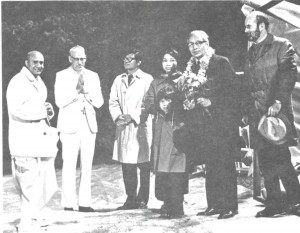 U Thant, accompanied by his family, takes leave of Sri Chinmoy. From left to right: Sri Chinmoy, Mr. Sol Montlack, President of the New York Sri Chinmoy Centre; Dr. Tyn Myint U, Mrs. Aye Aye Myint U, Master Thant Myint U [U Thant’s son in-law, daughter and grandson], U Thant and Mr. Donald Keys (Photos: Sri Chinmoy Centre Photographers)
U Thant, accompanied by his family, takes leave of Sri Chinmoy. From left to right: Sri Chinmoy, Mr. Sol Montlack, President of the New York Sri Chinmoy Centre; Dr. Tyn Myint U, Mrs. Aye Aye Myint U, Master Thant Myint U [U Thant’s son in-law, daughter and grandson], U Thant and Mr. Donald Keys (Photos: Sri Chinmoy Centre Photographers)
* * * * * * * * * * * * * * * * * * *
“U Thant was very pleased with the performance,” Sri Chinmoy recalled afterwards. “I was sitting beside him, and I remember that on his own, he went up to the stage to congratulate all the players, especially the young man who performed the role of the Buddha.”
* * * * * * * * * * * * * * * * * * *
It also appears in
Periodic Bulletin of Meditation Group at UN, Nov 1974 Issue Dedicated to U Thant
Part (A) Contents with dedication.
Part (G) Performance of “Siddhartha Becomes the Buddha”
Gallery:
- 1973-06-00-09-may-25-Buddha-Play-UThant-Sri-Chinmoy-scene-scaled.jpg June 29, 2020
- 1973-06-00-10-may-25-Buddha-Play-UThant-Sri-Chinmoy.j
- 1973-06-00-01-may-25-Buddha-Play-UThant-Sri-Chinmoy-scaled
- 1973-06-00-01-may-25-Buddha-Play-UThant-Sri-Chinmoy-crp-scaled.
- 1973-06-00-01-may-25-Buddha-Play-UThant-Sri-Chinmoy-crp-2.j
- 1973-06-00-06-may-25-Buddha-Play-UThant-Sri-Chinmoy-scaled
- 1973-06-00-06-may-25-Buddha-Play-UThant-Sri-Chinmoy-wilcomes-crp.
- 1973-06-00-07-may-25-Buddha-Play-scene-Harrison-NY-scaled.j
- 1973-06-00-07-may-25-Buddha-Play-scene-Harrison-NY-crp.
- 1973-06-00-08-may-25-Buddha-Play-Scene-crp-scaled.jp
- 1973-06-00-09-may-25-Buddha-Play-UThant-Sri-Chinmoy-scaled
- 1973-06-00-08-may-25-Buddha-Play-Scene-scaled.j
